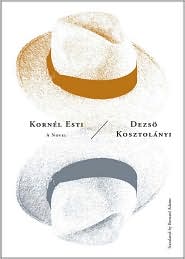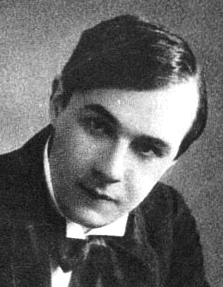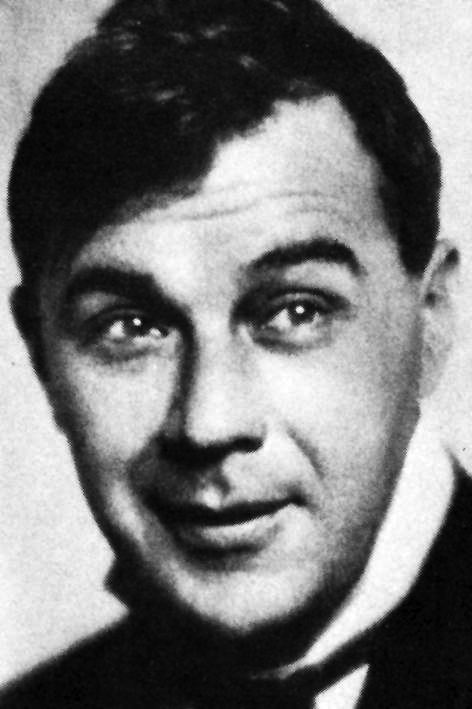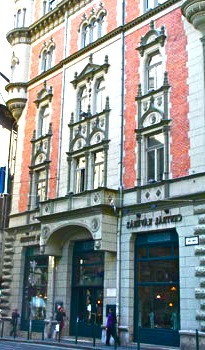“Whom can I admire…if not you, my brother and my opposite? Identical in everything and different in everything…I worship my people, my language. I can only live and breathe here in Hungary, but you travel the world, fly above nations, in freedom, shrieking everlasting revolt. I need you. I’m empty and bored without you. Help me, otherwise I’ll die.”
Written i n 1933, but only recently translated into English, Kornel Esti is Hungarian author Dezso Kosztolanyi’s last book, a unique combination of wild romp, thoughtful contemplation of life’s mysteries, and dark commentary on life’s ironic twists. Regarded by the Guardian as “a ringleader in the 20th century flowering of Hungarian literature,” Dezso Kosztolanyi (1885 – 1936), a poet, fiction writer, and journalist, creates a narrator who is also a writer, telling us from the outset that the narrator, now forty, has suddenly decided to contact his oldest friend from childhood. The two friends are complete opposites—the narrator, timid and repressed, is utterly lacking in confidence, while Esti is outrageous, afraid of nothing, and iconoclastic. In their shared childhood, which the narrator reveals through snippets of reminiscence, Esti urges, “Don’t wash up, stay dirty, hooray for dirt.” As they grow older, Esti is “forever getting mixed up in escapades” and practical jokes. As an adult he is a trickster for whom tomorrow never comes, a man who never repays loans, sends anonymous letters, passes out drunk in the street, insults important people, seduces young girls, and lives his life with impunity.
n 1933, but only recently translated into English, Kornel Esti is Hungarian author Dezso Kosztolanyi’s last book, a unique combination of wild romp, thoughtful contemplation of life’s mysteries, and dark commentary on life’s ironic twists. Regarded by the Guardian as “a ringleader in the 20th century flowering of Hungarian literature,” Dezso Kosztolanyi (1885 – 1936), a poet, fiction writer, and journalist, creates a narrator who is also a writer, telling us from the outset that the narrator, now forty, has suddenly decided to contact his oldest friend from childhood. The two friends are complete opposites—the narrator, timid and repressed, is utterly lacking in confidence, while Esti is outrageous, afraid of nothing, and iconoclastic. In their shared childhood, which the narrator reveals through snippets of reminiscence, Esti urges, “Don’t wash up, stay dirty, hooray for dirt.” As they grow older, Esti is “forever getting mixed up in escapades” and practical jokes. As an adult he is a trickster for whom tomorrow never comes, a man who never repays loans, sends anonymous letters, passes out drunk in the street, insults important people, seduces young girls, and lives his life with impunity.
Born on March 29, 1885, the same day and time as both the narrator and author Dezso Kosztolanyi, Kornel Esti also looks just like the narrator and is clearly his alterego, now down on his luck. When they first reconnect, the narrator tries to rekindle the friendship, but Esti accuses him of being “sentimental, as always.” The narrator continues to appeal to him, however: “You have changed, [Kornel]. When we were children, you were the grown-up, you were the leader, you opened my eyes. Now you’re the child.” Each has followed his own philosophy and pattern of life as far as he can, and neither one is happy. The narrator is too staid; Kornel Esti is out of control.

Since they are both writers, the narrator suggests that they make a deal to write something together. “Make me whole again,” the narrator begs, “like you used to…Let’s be joint authors. One man isn’t enough to write and live at the same time. Those who’ve tried it have all broken down sooner or later…But if we joined forces, Kornel, we might perhaps get somewhere near [wisdom]. Like Night and Day, Reality and Imagination, Ahriman and Ormuzd.” They agree that Kornel Esti will simply talk about what’s happened to him in his life, a “biography in the form of a novel,” and the narrator will record his observations in shorthand. It makes no difference whether the episodes are true or not—“A dream is also reality. If I dream that I’ve been to Egypt, I can write an account of the journey.” The narrator will record what Esti says, then erase some of it: Five out of ten of Esti’s images—and epithets—will stay, and the novel will be in fragments, as befits the narrator’s poetic style. At Esti’s suggestion, the narrator will be listed as author of the book, and Kornel Esti’s name will be the title. “The title’s in bigger letters,” Esti jokes.
What fol lows is a series of eighteen episodes, ranging from Kornel Esti’s first day of school, in 1891 (“He was a skinny, anemic little boy, with transparent ears”), through a symbolic tram ride at the end of the novel, a brief chapter in which the narrator/author’s entire philosophy is summed up through Esti’s late-in-life experiences on an overcrowded tram. In between are moments of high comedy, poignant drama, and shocking cruelty, all reflecting aspects of Esti’s life, either real or imagined, and all contributing to the broad panorama of human existence. On an early trip to Italy, for instance, Esti experiences the joy of speaking Italian and “escaping from the prison in which he had been confined since birth.” He swims in the ocean for the first time and finds that a “kiss and that journey had consecrated him for something.” He visits a town (reminiscent of the writing of Swift) in which everyone speaks only the truth. (A bookstore advertises a book as “unreadable rubbish” by an “old writer who has gone senile.”) He visits with his poet friends in coffeehouses in Budapest, comes into a huge inheritance, deals with a mad friend, and learns that “Life has its ups and downs…but let’s add that not only has it ups and downs, it also has deep meaning.”
lows is a series of eighteen episodes, ranging from Kornel Esti’s first day of school, in 1891 (“He was a skinny, anemic little boy, with transparent ears”), through a symbolic tram ride at the end of the novel, a brief chapter in which the narrator/author’s entire philosophy is summed up through Esti’s late-in-life experiences on an overcrowded tram. In between are moments of high comedy, poignant drama, and shocking cruelty, all reflecting aspects of Esti’s life, either real or imagined, and all contributing to the broad panorama of human existence. On an early trip to Italy, for instance, Esti experiences the joy of speaking Italian and “escaping from the prison in which he had been confined since birth.” He swims in the ocean for the first time and finds that a “kiss and that journey had consecrated him for something.” He visits a town (reminiscent of the writing of Swift) in which everyone speaks only the truth. (A bookstore advertises a book as “unreadable rubbish” by an “old writer who has gone senile.”) He visits with his poet friends in coffeehouses in Budapest, comes into a huge inheritance, deals with a mad friend, and learns that “Life has its ups and downs…but let’s add that not only has it ups and downs, it also has deep meaning.”

Eventually, he waxes philosophical—on sleep vs. insomnia, on paranoia vs. schizophrenia, on gentleness as “roughness in disguise,” on the obligations of family, on one’s need to feign interest and sympathy toward the misfortunes of others, and on boredom, even with those to whom one once felt extremely close. These commentaries are all incorporated neatly within episodes which entertain on the level of story, though the reader has no idea which episodes and their conclusions are real and which are fictional. And that, perhaps, may be part of what this novel of episodes may be all about. By blurring the line between reality and fiction, the author raises the question of whether it makes any difference whether events actually happened. Does actuality make a difference in the truth of the observations and the behavior of the characters? Is it not possible that imagination can provide as much insight and knowledge as reality? Ultimately, I found myself re-imagining events and episodes and seeing them in new ways, and I could not get this book out of my head. For a book that is almost eighty years old, but feels absolutely new and unique, that is an amazing achievement.
Photos, in order: The author’s first photo reflects the image of the author as a young man—timid, repressed, and insecure. http://nyugat.oszk.hu
The second photo shows the author as “Kornel Esti,” mischievous, even outrageous, and afraid of nothing. http://www.c3.hu
The Central Cafe, where the author and many of his friends gathered in Budapest, is shown here: http://www.c3.hu
A note on the translation: Translator Bernard Adams creates an elegant and subtle translation, befitting the ideas of this novel, at the same time that he recognizes the energy and humor of the original. This translation won a PEN Translation Fund Award in 2009.
